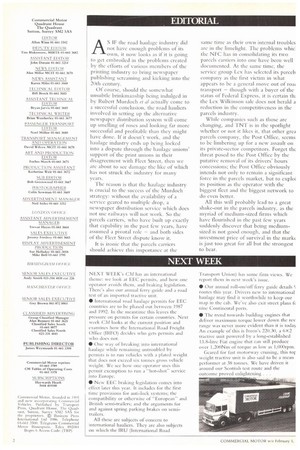A S IF the road haulage industry did not have enough
Page 2

If you've noticed an error in this article please click here to report it so we can fix it.
problems of its own, it now looks as if it is going to get embroiled in the problems created by the efforts of various members of the printing industry to bring newspaper publishing screaming and kicking into the 20th century.
Of course, should the somewhat unsubtle brinkmanship being indulged in by Rubert Murdoch et al actually come to a successful conclusion, the road hauliers involved in setting up the alternative newspaper distribution system will come up smelling of roses and looking far more successful and profitable than they might have done. If it doesn't work, and the haulage industry ends up being locked into a dispute through the haulage unions' support of the print unions in their disagreement with Fleet Street, then we are about to see damage the like of which has not struck the industry for many years. .
The reason is that the haulage industry is crucial to the success of the Murdoch strategy: without the availability of a service geared to multiple drop, a newspaper distribution service which does not use railways will not work. So the parcels carriers, who have built up exactly that capability in the past few years, have assumed a pivotal role — and both sides of the Fleet Street dispute know it.
It is ironic that the parcels carriers should achieve this importance at the same time as their own internal troubles are in the limelight. The problems whic: the NFC has in consolidating its two parcels carriers into one have been well documented. At the same time, the service group Lex has selected its parcels company as the first victim in what appears to be a general move out of mat transport — though with a buyer of the status of Federal Express, it is certain tl% the Lex Wilkinson sale does not herald a reduction in the competitiveness in the parcels industry.
While companies such as those are changing, and TNT is in the spotlight whether or not it likes it, that other grea parcels company, the Post Office, seems to be limbering up for a ncw assault on its private-sector competitors. Forget tin: threat posed to the Post Office by the putative removal of its drivers' hours concessions; the Post Office obviously intends not only to remain a significant force in the parcels market, but to exploi its position as the operator with the biggest fleet and the biggest network to do even better.
All this will probably lead to a great shake-out in the parcels industry, as the myriad of medium-sized firms which have flourished in the past few years suddenly discover that being mediumsized is not good enough, and that the investment price of survival in the mark( is just too great for all but thc strongest to bear.




















































